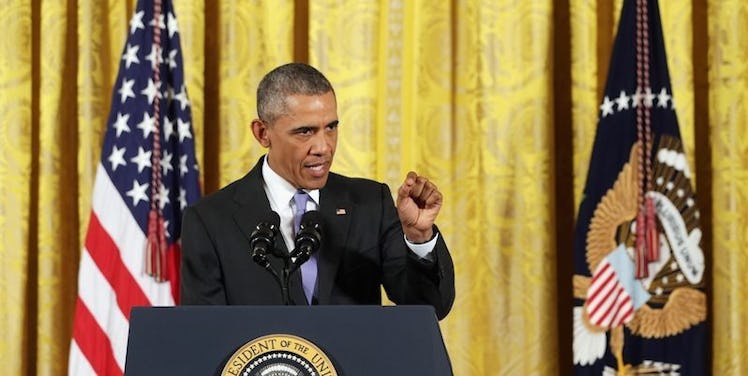
It's Great Obama Wants To Close Gitmo, But His Plan Really Kind Of Sucks
On Tuesday, President Obama sent Congress a plan to close Guantánamo Bay (Gitmo) -- the controversial detention camp in Cuba where hundreds of alleged terrorists have been housed since it was opened in 2002.
Here's a look at Gitmo over nearly 15 years, by the numbers: https://t.co/LVdPgZpQwf pic.twitter.com/pLnpPyKNKc — ProPublica (@ProPublica) February 23, 2016
The president announced the plan from the White House, making it clear he believes closing Gitmo should be a top priority for the US. He said,
I don't want to pass this problem on to the next president, whoever it is. And if, as a nation, we don't deal with this now, when will we deal with it? Keeping this facility open is contrary to our values. It undermines our standing in the world. It is viewed as a stain on our broader record of upholding the highest standards of rule of law.
Gitmo has long been seen as a prime representation of the civil liberties and human rights violations the US committed while seeking to address perceived terror threats.
The US engaged in many shameful practices following the tragic events of 9/11, from warrantless surveillance and targeted killings to enhanced interrogation techniques (torture).
Correspondingly, under dubious legal justifications, President George W. Bush and President Barack Obama both employed the policy of indefinite detention against individuals suspected of having ties to terrorism. They did so in spite of the fact it represents a profound departure from America's purported values.
Indeed, Gitmo is a palpable reminder of this nation's hypocrisy.
One might say the detention center essentially serves as a recruiting poster for terrorism, as it's been focused on fairly heavily in jihadist media and propaganda.
Accordingly, in many ways it's great the president wants to close Gitmo, as he pledged to do so during his campaign in 2008 and has repeatedly failed to deliver on. More importantly, there are many ethical and practical reasons to shut it down.
But, when it comes down to it, the president's plan to close Gitmo is extremely vague and will have little to no support in Congress, as legislators are already expressing their opposition to it.
Moreover, the plan doesn't deal with one of the major issues that's made the prison so controversial in the first place: the indefinite imprisonment of individuals who haven't stood trial or been charged with a crime.
Close #Gitmo plan still has indefinite detention w/o charge or trial. That might close the place, but it won't end the illegality. #Legacy — Hina Shamsi (@HinaShamsi) February 23, 2016
There are currently 91 detainees at Guantánamo, 35 of whom have been deemed eligible for transfer (as they are no longer viewed as threats to national security). The president's plan calls for the secure transfer or repatriation of these individuals while working to determine if other detainees are eligible for transfer.
The plan also calls for the prosecution of some detainees in military or federal courts.
Most of this seems like a reasonable way forward.
But the more troublesome aspect of the president's plan involves placing a number of the remaining detainees in detention facilities on US soil. Omar Shakir, a lawyer with the Center for Constitutional Rights, aptly explained why this is so problematic saying,
The infamy of Guantánamo has never been its physical location but the legal regime of indefinite detention without charge that underpins it. The administration's proposal contains a number of measures that we have long advocated. But importing indefinite detention to the United States is not a plan to 'close Guantánamo.' It's a plan to move Guantánamo to another ZIP code.
There's also the fact the president's plan doesn't designate which prisons or facilities the detainees should be held in, instead suggesting 13 potential but unspecified locations reportedly inspected by the Pentagon.
Additionally, it's presently illegal under US law to transfer detainees from Gitmo to the US for trial or hold them in a detention facility on US soil.
For all of these reasons and more, the president is already being criticized from all sides over this plan.
There are many (primarily Republicans), who believe keeping Gitmo open helps keep Americans safe, despite the evidence to the contrary. This is where some of the strongest opposition to Obama's plan is emanating from.
Obama's plan to close Gitmo is a continuation of prioritizing his own legacy over the safety of the American people. https://t.co/1D3s9gKceY — Marco Rubio (@marcorubio) February 23, 2016
But there are also those who would like to see Gitmo closed, but in a way that reflects a major shift in America's approach to the detention of alleged terrorists and counterterrorism more generally.
We welcome aspects of this, but not moving some of the detainees to the U.S. for continued detention without charge https://t.co/Gev2gzg5Yt — Naureen Shah (@naureenshah) February 23, 2016
Simply put, if the process of closing Gitmo doesn't involve fully upholding and promoting human rights, then there's almost no point in moving forward.
We don't want to live in a country where due process is not respected, regardless of what an individual has been accused of.